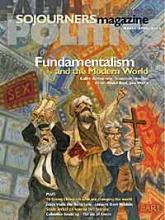Years ago when my mother was quite ill, a friend copied a poem and surreptitiously slipped it into my Bible. I discovered it weeks later when, on a train returning from one of my visits home, I opened my Bible in search of comfort, though I doubted I would find any. I still attribute the moment to the hand of God, unsophisticated as that sounds, and the poem has been stuck to my bulletin board ever since.
Suspended
I had grasped God's garment in the void
but my hand slipped
on the rich silk of it.
The ‘everlasting arms' my sister loved to remember
must have upheld my leaden weight
from falling, even so,
for though I claw at empty air and feel
nothing, no embrace,
I have not plummeted.
—Denise Levertov
Denise Levertov's experience of God's sustaining love begat in her the need to put it on paper, a need my friend then shared in his desire to offer her words to me. And in that moment, I felt the everlasting arms, mediated by a slip of paper born of love.
In many ways, the New Testament is just such an offering. Though those witnesses lived in an entirely different world than ours, they possessed that same deeply human desire to share joy. These weeks of Lent into Easter, we are given multiple ways of reliving what Albert Schweitzer calls the "mystical doctrine of redemption through being-in-Christ." I encourage you to read the biblical texts first as poems from fellow travelers who long to share the mysterious joy and sadness of falling and being held. Because that is how the Word comes to life.
Kari Jo Verhulst, a Sojourners contributing writer, is an M.Div. student at Weston Jesuit School of Theology in Cambridge, Massachusetts. "Suspended," from Evening Train, ©1992 by Denise Levertov. Reprinted by permission of New Directions Publishing Corp.
Read the Full Article
